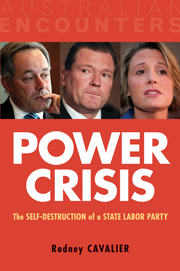Book contents
- Frontmatter
- Contents
- Australian Encounters with the ALP
- Preface
- Acknowledgements
- Introduction
- 1 NSW Labor and its leaders
- 2 Death below
- 3 The rise of Morris Iemma
- 4 Annual Conference, May 2008
- 5 Morris Iemma falls
- 6 The protracted fall of Nathan Rees
- Epilogue: Does party membership matter?
- Appendix A NSW ALP branches closed 1999–2009
- Appendix B NSW ALP financial membership 2002–09
- Appendix C Delegates to NSW ALP Annual Conference, May 2008
- Sources
- Index
- Australian Encounters series
- Forthcoming titles in the Australian Encounters series
Epilogue: Does party membership matter?
Published online by Cambridge University Press: 10 January 2011
- Frontmatter
- Contents
- Australian Encounters with the ALP
- Preface
- Acknowledgements
- Introduction
- 1 NSW Labor and its leaders
- 2 Death below
- 3 The rise of Morris Iemma
- 4 Annual Conference, May 2008
- 5 Morris Iemma falls
- 6 The protracted fall of Nathan Rees
- Epilogue: Does party membership matter?
- Appendix A NSW ALP branches closed 1999–2009
- Appendix B NSW ALP financial membership 2002–09
- Appendix C Delegates to NSW ALP Annual Conference, May 2008
- Sources
- Index
- Australian Encounters series
- Forthcoming titles in the Australian Encounters series
Summary
The Rudd government was the first federal Labor government with no meaningful connection to the Labor Party. A parliamentary leadership – courtesy of the taxpayers – enjoys a dominating public presence, unlimited travel, a standing army of MPs, a larger army of well-paid staffers, furnished offices in every capital city, computers, telephones and postage and stationery. Public funding of election campaigns and donations from the corporate sector have rendered unimportant the contributions of cash and energy from unions and party members. Electors are reached by direct mail and electronic mail. The letterbox delivery of the candidate's pamphlet is decidedly old hat. Local campaigns are not run locally and are local only in the sense that any deviations from the central message are authorised to the last comma. The organisation of the modern political party does not require a presence below, not even at election times – except perhaps for the odd photo opportunity.
Modern Labor operates in accordance with an axiom: a parliamentary leader sustained by good opinion polls will prevail on all matters, including decisions contrary to party policy. Where Morris Iemma had failed in New South Wales, Anna Bligh, Premier of Queensland, succeeded. She persuaded the Queensland ALP Conference to approve the sale of a wide range of public assets so as to overcome a shortage of finance. Her arguments were no more or less compelling (or specious) than those put by Morris Iemma but Bligh was a winner riding high in the polls.
- Type
- Chapter
- Information
- Power CrisisThe Self-Destruction of a State Labor Party, pp. 184 - 186Publisher: Cambridge University PressPrint publication year: 2010



